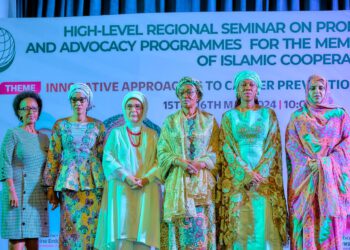A new index designed to fill a critical information gap and help African governments, health officials, non-governmental organizations, and others respond to the coronavirus pandemic finds that although Africa has not yet been overwhelmed by COVID-19, several regions are showing troubling signs of vulnerability to the social, economic, and health impacts of an outbreak that should not be ignored.
The Africa COVID-19 Community Vulnerability Index (CCVI), developed by Surgo Foundation, was modeled after Surgo’s U.S. COVID-19 Community Vulnerability Index, which is featured as a resource by the U.S. Centers for Disease Control and Prevention. It is the first Pan-African index to assess vulnerability to COVID-19 not just across, but within countries.
“By showing us the different ways African regions can be vulnerable to COVID-19 beyond just mortality, this index gives us predictive power we’ve never had before,” said Dr. SemaSgaier, executive director of Surgo Foundation. “While it does not predict which regions are at risk of having outbreaks, it does predict whether a region in Africa is able to mitigate the health, economic, and social impacts of COVID-19 and what downstream consequences each region should plan for.”
The Africa CCVI ranks 751 regions across 48 African countries in terms of vulnerability to COVID-19 based on seven key themes: socioeconomic status, population density, access to transportation and housing, epidemiological factors, health system factors, fragility, and age of population. It is the only index to measure vulnerability to COVID-19 across the African continent at a subnational level.
“The Africa COVID-19 Community Vulnerability Index fills an information gap that has challenged the global development community for too long,” said Magdalena Banasiak, Senior Innovation Adviser at DFID, who manages the COVIDActionprogramme, which co-funded the index. “Until now, limited COVID-19 data in Africa has not provided a true reflection of where this pandemic could have the greatest impact–partly due to low scale-up of testing, and partly due to incomplete reporting. Now we can better understand and prioritisepandemic response efforts not just across, but within African countries.”
Key Findings
1) Africa’s relatively young population is so far proving to be its best defense against COVID-19 deaths.
2) Vulnerability to COVID-19 is not distributed evenly across the continent, with drivers of vulnerability varying by region.
3) Many kinds of vulnerability co-exist within regions, and seem to be correlated to some extent:
4) Mobility has by and large decreased across the continent over the last few months, but the most vulnerable areas are the least likely to practice social distancing.
To explore the index and learn more, visit precisionforcovid.org/africa.
The Africa CCVI is made possible in part through support by the #COVIDAction Data Challenge, via an award from the UKAID Department for International Development (DFID)’s Frontier Technologies Hub.
Technical Notes:
Countries excluded due to lack of data: Cape Verde, Equatorial Guinea, Guinea-Bissau, Mauritius, Mayotte (France), Réunion(France), São Tomé and Príncipe, Seychelles, and Western Sahara.
Data Sources: Demographic and Health (DHS) Surveys, Institutes of Health Metric and Evaluation (IHME), Malaria Atlas Project, Uppsala Conflict Data Program, UNHCR, World Bank, Open data for Africa, Multiple Indicator Cluster Surveys (MICS), Armed Conflict Location & Event Data Project (ACLED), Global Roads Inventory Project, World Pop, and Global Data Lab. Mobility data are from Google. Fatality and hospitalization rates are from Salje et al. (2020) in Science and kindly provided by Dr Mumtaz and Prof. Raddad.





















